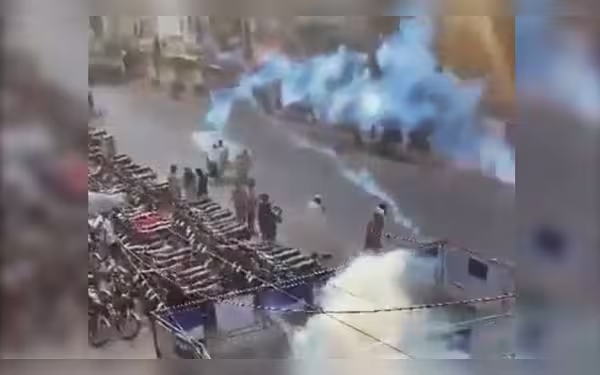Thursday, November 7, 2024 12:54 PM
PTI Protest Rallies in Punjab Face Police Crackdown
- PTI organizes protests despite Section 144 enforcement.
- Over 500 PTI supporters arrested in Punjab.
- Government cites security risks for public gathering ban.
 Image Credits: geo
Image Credits: geoPTI faces police crackdown in Punjab for protests against Section 144, leading to over 500 arrests amid calls for judicial independence.
In a significant turn of events, the Pakistan Tehreek-e-Insaf (PTI) party, founded by Imran Khan, has found itself at the center of controversy as it organized protest rallies across various cities in Punjab. This comes in the wake of the Punjab government imposing Section 144 of the Criminal Procedure Code (CrPC), which prohibits public gatherings. The situation escalated on Wednesday when Punjab police arrested over 500 PTI supporters and lawmakers for violating this law.
Imran Khan, currently incarcerated in Rawalpindi's Adiala Jail, had called for nationwide protests just a day prior, urging his supporters to rally for the independence of the judiciary. The PTI's decision to proceed with protests in cities like Multan, Mianwali, and Faisalabad directly challenged the government's ban on public gatherings. The Punjab government justified the imposition of Section 144 by citing concerns over the current law and order situation, labeling it a "soft target" for miscreants and a serious security risk.
As the protests unfolded, the police responded with a heavy-handed approach, employing tear gas to disperse crowds in Faisalabad. Among those arrested were notable PTI members, including MPAs Nadeem Sadiq Dogar, Khayal Ahmad Kastro, and Javed Niaz Manj. The crackdown on PTI supporters has sparked a heated debate about the right to protest and the government's response to dissent.
Prime Minister's Adviser on Public and Political Affairs, Rana Sanaullah, criticized the PTI's actions, stating that their behavior was "not political" and that the party has failed to maintain a proper political posture. He accused the PTI of seeking "anarchy, violence, and unrest" in the country, emphasizing the need to curb such actions for the sake of law and democracy. Similarly, Punjab Chief Minister Maryam Nawaz remarked that no one in her province responded to PTI's call for protests, alleging that the party brings in supporters from Khyber Pakhtunkhwa to bolster their numbers.
This situation raises important questions about the balance between the right to protest and maintaining public order. While the PTI argues for judicial independence, the government's strict enforcement of Section 144 highlights the challenges faced in managing political dissent in Pakistan. As the political landscape continues to evolve, it remains crucial for all parties involved to engage in constructive dialogue rather than resorting to confrontation. The future of political expression in Pakistan may depend on finding common ground amidst these turbulent times.













